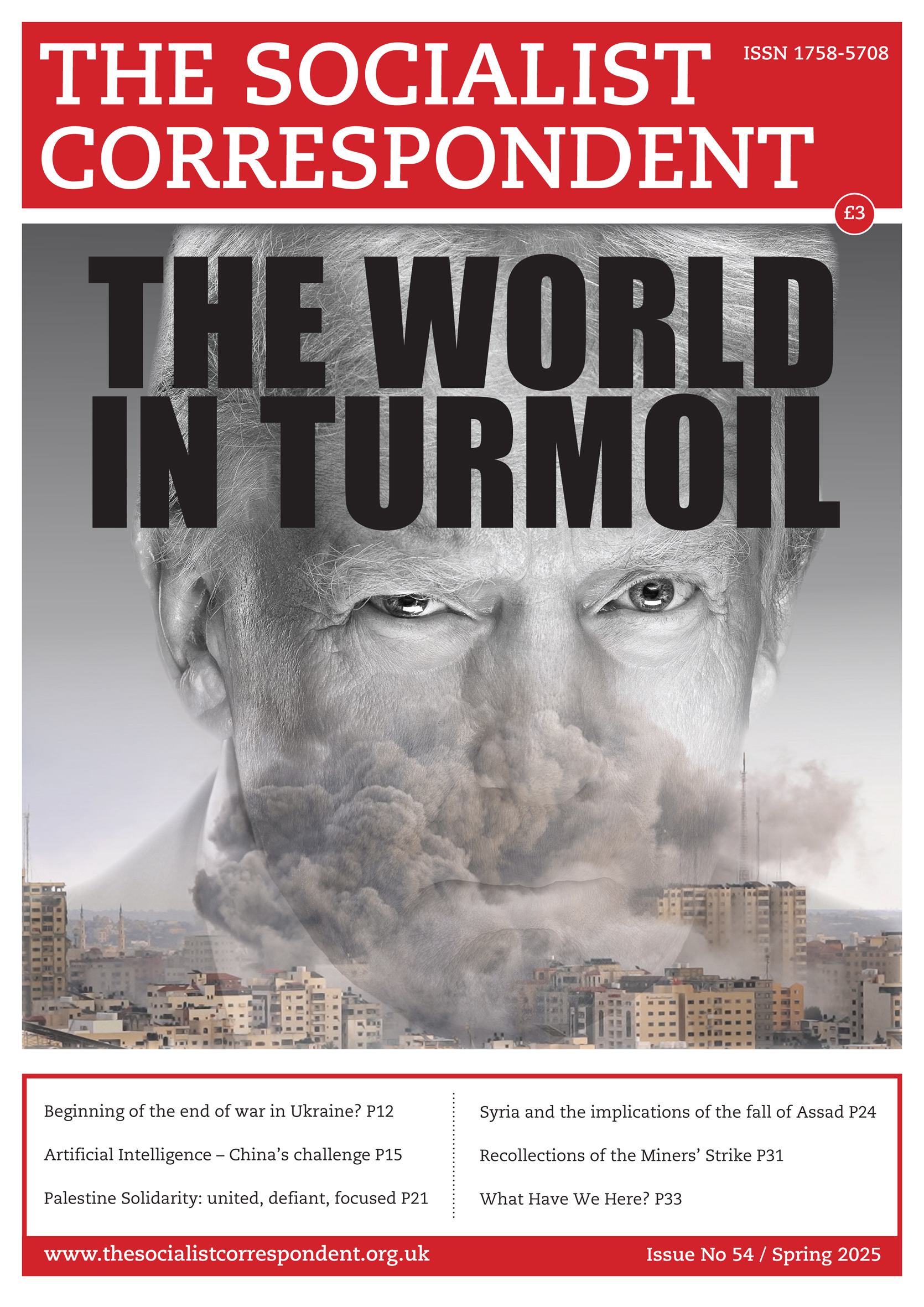Issue 54 Spring 2025
CONTENTS: Trump's world order, the West and the UK, Frieda Park: Beginning of the end of war in Ukraine, Alex Davidson Whither Trump? Paul Sutton Artificial Intelligence - China's Challenge, Helen Christopher Palestine Solidarity: united, defiant, focused, Leila Ryan Syria and the implications of the fall of Assad, Simon Korner The German Democratic Republic - a different world, Pat Turnbull Recollections of the Miners Strike, Book review by Peter Latham What have we here? Exhibition review by Brian Durrans
COMMENTARY
Donald Trump is a man in a hurry. Better prepared than when he came to office in his first term as President, he has embarked at breakneck speed on achieving his international and domestic objectives. He is not hampered by the niceties of diplomacy nor does he pay lip service to other countries and their leaders. This has come as a shock to Western “allies” of the US, whose second class position in relation to the world’s hegemonic superpower Trump has made painfully clear. They are struggling to adjust to this new reality.
Trump’s world order
The implications of this are explored by Frieda Park in, Trump’s world order, the West and the UK. She points out just how weak the other old imperialist countries are economically and how their political systems are failing. The EU, particularly is struggling with multiple problems of weak leaders and economic and political stagnation. In Britain too Kier Starmer’s government is failing to address the country’s economic problems nor is it trying to meet the needs of the British people. In fact, the reverse. It is threatening more cuts to welfare and services to fund war and the arms build-up.
So the old imperial European powers are not well placed to challenge Trump by carving out an independent road for themselves. But he will face other challenges from within the US establishment and from a disgruntled voter base, who will be made worse off by his policies. There will be resistance too from the Global South. The question is what will the long-term impact of his policies be and will he actually make the US stronger or weaker?
Trump’s focus on China
Trump is motivated by a desire to ensure US supremacy in the face of China which is developing rapidly. No other country poses such a threat and he wants to clear the decks for that fight, hence his attempt to end the war in Ukraine on terms favourable to the United States. The dynamics of this are explored in Beginning of the end of war in Ukraine? by Alex Davidson. He also considers other aspects of Trump’s imperial agenda – his designs on Greenland and Panama and how they relate to his desire to prevent China challenging US power.
The threat from China to the US and the West is real but it is not a military one, as the media would have us believe, which is used as the pretext for increased arms spending. In fact, it is the US that has threatened to annex Canada, take over Greenland, take back the Panama Canal (which it has partly succeeded in) take over Ukrainian mineral resources and redevelop Gaza ethnically cleansed of Palestinians. By contrast, what China has been doing is developing its technology and industry so that it is now a leading force in hi tech and green industries. This came into sharp relief with the success of DeepSeek’s new artificial intelligence system, which is described in Helen Christopher’s Artificial Intelligence – China’s challenge. This is what motivates Trump. He wants to focus on the serious challenge that China poses to the United States status as the world’s one superpower.
Solidarity with Palestinians
Although Trump is notoriously erratic, beneath the surface of this and his egregious, insulting behaviour there are consistencies. One is that he will continue to support Israel as the bastion of US interests in the Middle East. Despite the ceasefire in Gaza, which Israel had long resisted, there has been little respite for the Palestinians who continue to suffer from Israel’s genocidal actions both in Gaza and the West Bank.
One bright spot in a rather grim political landscape in Britian has been the unified and determined campaigning by activists in solidarity with Palestine. Leila Ryan sets out their central demands and plans for future campaigning in Palestine Solidarity: united, defiant, focused. In particular we can learn from the past success of the boycott of South African apartheid to mobilise people to boycott Israeli apartheid now.
Syria
Whilst the Palestinians remain steadfast in resisting genocide, their situation has been made worse by Israel’s success in weakening Hezbollah and the fall of Assad in Syria. In Syria and the implications of the Fall of Assad, Simon Korner gives the history behind the West’s objective of destroying the government there and the long campaign of military action and sanctions which eventually led to Assad’s defeat. He also analyses the current situation and future prospects for Syria and the region. The West backs the terrorists who now control the country and who are oppressing and killing people from ethnic and religious minorities and women from all groups. Meanwhile the United States is still involved and Israel and Turkey are vying to carve up bits of Syria for themselves. The future looks grim for Syrians.
Where next for the world?
There have been several unexpected events in the last three years which have had far-reaching consequences and, especially with Trump at the helm, the world is in a very volatile phase. It is difficult to predict what the next event will be that will upset the global order and whether it will be one that will benefit imperialism or the forces ranged against it.
Read the PDF version of Issue 54

